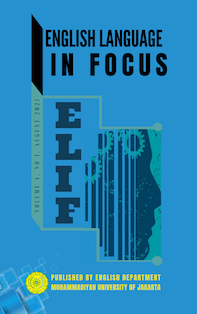Non-EFL Students Vocabulary Learning Strategies
DOI:
https://doi.org/10.24853/elif.4.1.51-60Keywords:
Keywords, Student perception, Vocabulary, StrategyAbstract
As development progresses, international competition and cooperation cannot be avoided. This phenomenon will encourage students to participate in it. Therefore, the ability to speak English is an important component to be involved in this phenomenon. Various countries in the world have been competing to apply English to their children from an early age. This study will focus on students' perceptions of vocabulary strategies in learning English. This study involved 32 participants from different universities and data collection was done through a questionnaire. The results showed that the participants liked to use learning strategies, and they agreed that using strategies in learning could improve the quality of vocabulary learning. As well as train their language skills, reasoning abilities, and understanding of the content of word use. Even though they are not consistent with just one strategy, from the data, presented, they almost ever do all the strategies offered.References
Adnan, M. (2020). Online Learning Amid the COVID-19 Pandemic: Students Perspectives. Journal of Pedagogical Sociology and Psychology, 1(2), 45–51. https://doi.org/10.33902/JPSP.2020261309
Baber, H. (2020). Determinants of Students’ Perceived Learning Outcome and Satisfaction in Online Learning during the Pandemic of COVID19. Journal of Education and E-Learning Research, 7(3), 285–292. https://doi.org/10.20448/journal.509.2020.73.285.292
Biolcati, R., Mancini, G., & Trombini, E. (2018). Proneness to Boredom and Risk Behaviors During Adolescents’ Free Time. Psychological Reports, 121(2), 303–323. https://doi.org/10.1177/0033294117724447
Fandiño, F. G. E., Muñoz, L. D., & Velandia, A. J. S. (2019). Motivation and E-Learning English as a Foreign Language: A Qualitative Study. Heliyon, 5(9), e02394. https://doi.org/10.1016/j.heliyon.2019.e02394
Fandiño, F. G. E., & Velandia, A. J. S. (2020). How an Online Tutor Motivates E-learning English. Heliyon, 6(8), e04630. https://doi.org/10.1016/j.heliyon.2020.e04630
Fachraini, S. (2017). An Analysis Of Students Motivation in Studying English. Getsempena English Education Journal, 4(1), 47-57. https://doi.org/10.46244/geej.v4i1.725
Fathiyah, H. I., Amiruddin, A. N., Khan, F., & Venzano, F. (2020). Language Learning Strategies (LLS) Used by Malaysian, Pakistani, and Italian ESL Learners: Comparing to Indonesian EFL Learners. English Language in Focus (ELIF), 2(2), 87-96. https://doi.org/10.24853/elif.2.2.87-96
Hadi, M. S., & Athallah, N. I. (2021). Gamification’s Effectiveness in Online English Teaching in the Pandemic Era. Jurnal Studi Guru Dan Pembelajaran, 4(2), 282-286. https://doi.org/10.30605/jsgp.4.2.2 021.590
Hadi, M. S., Zaitun, Z., & Aprilia, D. C. (2021). Student Perceptions about the Implementation of Web Applications During Distance Learning. Journal of English Language Teaching and Cultural Studies, 4(1), 1-9. http://dx.doi.org/10.48181/jelts.v4i1.10837
Hayikaleng, N., Nair, S. M., & Krishnasamy, H. N. (2016). Thai Students’ Motivation on English Reading Comprehension. International Journal of Education and Research, 4(6), 477-486. Retrieved from http://www.ijern.com/
Mahyoob, M. (2020). Challenges of e-Learning during the COVID-19 Pandemic Experienced by EFL Learners. Arab World English Journal, 11(4), 351–362. https://doi.org/10.24093/awej/vol11no4.23
Mazumder, Q. H. (2014). Student Motivation and Learning Strategies of Students from USA, China and Bangladesh. International Journal of Evaluation and Research in Education (IJERE), 3(4), 205–210. https://doi.org/10.11591/ijere.v3i4.6288
Mujtaba, I., Prapantja, Y., Khatuni, A., & Hadi, M. S. (2021). Online English Education: A Paradigm Shifts in Education System and Its Challenges. English Language in Focus (ELIF), 3(2), 119-126. https://doi.org/10.24853/elif.3.2.119-126
Pazoki, J. S., & Alemi, M. (2020). Engineering Students’ Motivation to Learn Technical English in ESP Courses: Investigating Iranian Teachers’ and Students’ Perceptions. RELC Journal, 51(2), 212–226. https://doi.org/10.1177/0033688218811371
Purnama, N. A., Rahayu, N. S., & Yugafiati, R. (2019). Students’ Motivation in Learning English. PROJECT (Professional Journal of English Education), 2(4), 539-544. https://doi.org/10.22460/project.v2i4.p539-544
Rachmah, N. (2020). Effectiveness of Online vs Offline Classes for EFL Classroom: A study Case in Higher Education. Journal of English Teaching, Applied Linguistics and Literatures (JETALL), 3(1), 19-26. https://doi.org/10.20527/jetall.v3i1.7703
Renz, S. M., Carrington, J. M., & Badger, T. A. (2018). Two Strategies for Qualitative Content Analysis: An Intramethod Approach to Triangulation. Qualitative Health Research, 28(5), 824–831. https://doi.org/10.1177/1049732317753586
Rosidah, W. (2021). Language Learning Strategies, English Motivation, and English Proficiency of Diploma EFL Learners in Malang. Language-Edu, 10(1), 1-9. Retrieved from http://riset.unisma.ac.id/index.php/LANG/article/view/9358/pdf
Shaaban, K. A., & Ghaith, G. (2000). Student Motivation to Learn English as a Foreign Language. Foreign Language Annals, 33(6), 632–644. https://doi.org/10.1111/j.1944-9720.2000.tb00932.x
Sormin, A. S. (2018). Analisis Kesulitan Belajar Bahasa Inggris Mahasiswa. LINGUISTIK : Jurnal Bahasa dan Sastra, 3(2), 217-234. https://doi.org/10.31604/linguistik.v3i2.217-234
Subakthiasih, P., & Putri, I. G. A. V. W. (2020). An Analysis of Students’ Motivation in Studying English During Covid-19 Pandemic. Linguistic, English Education and Art (LEEA) Journal, 4(1), 126–141. https://doi.org/10.31539/leea.v4i1.1728
Tiara, E., Supardi, I., & Salam, U. (2017). The Correlation Between Students Motivation and English Learning Achievement. Jurnal Pendidikan dan Pembelajaran Khatulistiwa, 8(1), 1-9. https://jurnal.untan.ac.id/index.php/jpdpb/article/view/30822
Ulfa, M., & Bania, A. S. (2019). EFL Student’s Motivation in Learning English in Langsa, Aceh. Studies in English Language and Education, 6(1), 163-170. https://doi.org/10.24815/siele.v6i1.12860
Weybright, E. H., Caldwell, L. L., Ram, N., Smith, E. A., & Wegner, L. (2015). Boredom Prone or Nothing to Do? Distinguishing Between State and Trait Leisure Boredom and Its Association with Substance Use in South African Adolescents. Leisure Sciences, 37(4), 311–331. https://doi.org/10.1080/01490400.2015.1014530
Zheng, C., Liang, J.-C., Li, M., & Tsai, C.-C. (2018). The relationship between English Language Learners’ Motivation and Online Self-Regulation: A Structural Equation Modeling Approach. System, 76, 144–157. https://doi.org/10.1016/j.system.2018.05.003
Downloads
Published
Issue
Section
License
Authors who publish with this journal agree to the following terms:
- Authors retain copyright and grant the journal right of first publication with the work simultaneously licensed under a Creative Commons Attribution License that allows others to share the work with an acknowledgment of the work's authorship and initial publication in this journal.
- Authors can enter into separate, additional contractual arrangements for the non-exclusive distribution of the journal's published version of the work (e.g., post it to an institutional repository or publish it in a book), with an acknowledgment of its initial publication in this journal.
- Authors are permitted and encouraged to post their work online (e.g., in institutional repositories or on their website) before and during the submission process, as it can lead to productive exchanges, as well as earlier and greater citation of published work (See The Effect of Open Access).


